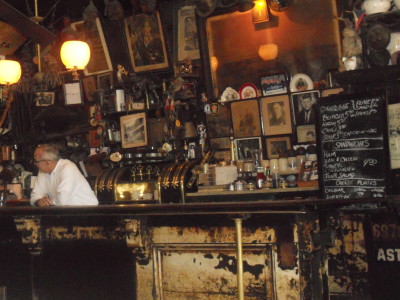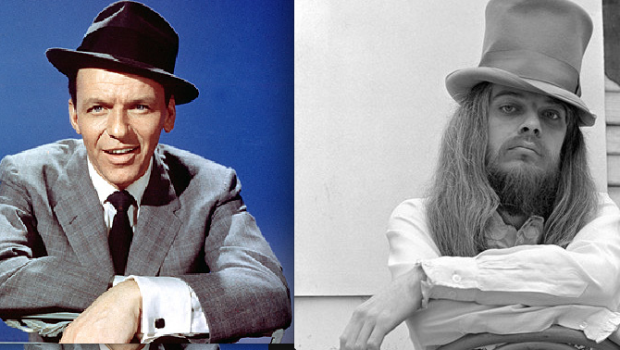
TV, HELL or HOBOKEN: Bars, Televisions and the War on Small Talk
Dipsomania aside, frequenting a bar where everybody knows your name is increasingly challenging. The utterance of a moniker is hard to trace within the blare and bedlam of chain gang bars, where the face of a single patron is indistinguishable from every other head tilted toward the halo of artifice, that chorus line of deafening, primary pigment flashing televisions.
Other than the pursuit of the mating ritual, the pub crawl is becoming obsolete. Pubs minus TV screens are a rare find and so making the effort to prop up another characterless bar just doesn’t cut it. It has less to do with the amount of Hoboken pubs per capita than the unsettling increase in the groundhog presence of televisions, that identikit feature of local nightlife, aloof and uninterested in age-old discourse. Sports TV has a place. The ‘big game’ requires a shared event space that is unquestionably dominant in American culture, but to assume that everyone is interested is lazy and presumptuous. A safe bet would be that for most of the time, most of the people would rather not have the same thing all of the time.
It has long been a common trick of drinking establishments to turn the volume of the music up in order to render all other sounds including speech inaudible. This is to create an uncomfortable exchange, thereby pushing customers to the bar in pursuit of more drinks. To add to which, the selected soundtrack is often repetitive beats designed to help you spend cash rhythmically. Over the years, that graceless tapping of unbroken-in-shoes upon pristine wooden floorboards has given fanfare to the plague of televisions, hitching themselves up above the bar in a devious alliance. When this solicitous line-up has its way, eyes and ears are sucked into the vacuum, if not out of genuine interest, then a defeat of the senses.
The homespun rustic pub, where toothed beams mark pub boundaries with antiquated currencies to seduce the eye, might only exist regionally in the form of jigsaw pieces, but putting them together at the very least requires some peaceful concentration. The sophisticated long bar that’s dim-lit corners are deliberately hushed for flourishing affairs are diminishing at the same rate as dive bar reparations to chair legs following bar room brawling. Whether it be a preference for pleasant company, refinement, hedonism or a quiet drink, such elemental pursuits are blocked by TV breeding, often up to a dozen of them in one bar. The good publican, unforthcoming with information but personable and patient, is now consumed with the all-angles-covered Big Brother TV eye. There are, it would appear, few places left to avoid them.
Long gone are the shanty bars of Hoboken docks, where blue-collar workers rubbed elbows with free thinking pleasure seekers and career criminals, with one eye on City Hall and the other on the Hudson tide. But there is a lot to be said for retaining a level of neglect and dishevelment, wholesome bait for the misfit pack, be they shady or artistic. Creativity, regardless of method, generates intriguing material.
The same goes for drinking alongside an age group normally shunned by businesses eager to catch the 20-34 year old demographic. Just recently, Findthebest.com listed Hoboken as the number one hipster city in the US, based on this very demographic—together with education levels and the availability of good coffee and yoga. The readiness of assorted bars is missing from the list of requirements but the sheer number of them may result in one or two changing tact.
The domino effect of bars taking on individual or idiosyncratic traits is much harder to predict and therefore much more interesting.
Hipsters change tastes and ascend in age just as the seams of skinny jeans split or fray. As for those aged 35 and above, chances are, the longer time there is to stock up on stories, of a better standard they will be. Good storytelling deserves to be heard in spaces willing to expedite them.
No matter the misconduct, bars have long harbored the many uneven rungs of misbehavior, more mischief than aggression, although there is room for the two even if the space is cramped.
The jukebox, another relic to rival conversation, allows patrons a recreational democracy that can be responsible for binding rapports, debate or grievances, all of which are interesting to partake in or observe. The nature of winding down after a stressful day of work or unemployment, is to want to shift into a darkened space.
Here we can talk to people we shouldn’t about unspeakable topics and toast our apparent decline. Stories are often plucked from uninhibited spontaneity, their unsullied abundance allowing us to pick and choose a point of view, a taxing endeavor in a bar intent on drowning out sound and originality. Hoboken in particular is a snug fit for its many bars, but at present their quality cannot be measured by diversity. While many are aesthetically distinct from one another, being able to choose a drinking establishment that fits a mixture of mood swings and demographics is, with very few exceptions, akin to a Holy Grail hunt.
Complaints regarding the number of pubs with TVs are as plentiful as pubs with TVs. Public opinion, so long as it is audible, doesn’t require market research. This perception of the whole herd moving on to pastures new in the absence of televisions is a baseless fear that defies good sense. There is a logical turnover in the lost and found. Recently, nearby Jersey City’s McGinley Square Pub made the news for being a TV and wifi free zone. Ironically, its TV shunning efforts won it a spot on television. A pub that can provide something so laughably unique deserves investing in.
Bars take note; these days, staying quiet can be good for business.
************************
Long before moving to the U.S., K. Krombie experienced an apprenticeship in petty crime from London’s finest, a short spell in a Japanese jail and a whole summer hiding out from the police in a caravan with Irish travelers. Since reformed and now relatively well behaved, K. Krombie now writes for a number of websites and magazines and has recently completed a novel set almost entirely in a pub.


 Previous Article
Previous Article Next Article
Next Article ROLLING STONED: Hoboken Police Arrest Florida Man for DUI, New Jersey Man for Possession of Marijuana
ROLLING STONED: Hoboken Police Arrest Florida Man for DUI, New Jersey Man for Possession of Marijuana  Hudson County Reporting 234 Cases of Coronavirus, Over 3,500 Statewide — $2 Trillion Federal Stimulus Package Announced
Hudson County Reporting 234 Cases of Coronavirus, Over 3,500 Statewide — $2 Trillion Federal Stimulus Package Announced  Jersey City Man Arrested for DUI on Motor Scooter in Hoboken
Jersey City Man Arrested for DUI on Motor Scooter in Hoboken  PLAY BALL: Baseball Trailblazer Maria Pepe Honored by Hoboken Little League
PLAY BALL: Baseball Trailblazer Maria Pepe Honored by Hoboken Little League  Fridays Are For Frank: “Forget Domani” (feat. Leon Russell) — Hoboken Arts & Music Festival Edition
Fridays Are For Frank: “Forget Domani” (feat. Leon Russell) — Hoboken Arts & Music Festival Edition  My Custom Cleanse: Strong to the Finish
My Custom Cleanse: Strong to the Finish  Hoboken PATH Train Service Faces Further Late-Night/Weekend Disruption
Hoboken PATH Train Service Faces Further Late-Night/Weekend Disruption  HOBOKEN DWI: Police Log Third Arrest This Week
HOBOKEN DWI: Police Log Third Arrest This Week